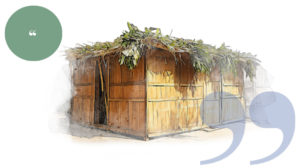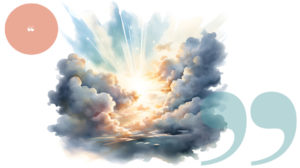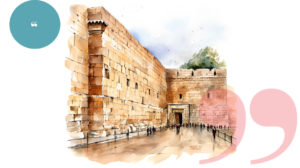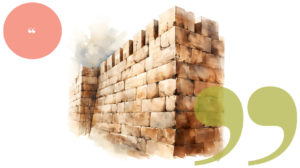Parshas Beha’aloscha: Digging a Riverbed

In order for the blessing of Hashem to rest upon man it’s vital that he prepare himself to receive it

“Upon the Word of Hashem Bnei Yisrael traveled; and upon the Word of Hashem they camped” (Bamidbar 9:18)
“For every action and movement that man wants to take he should say ‘im yirtzeh Hashem’ [if Hashem wants] or ‘b’ezras Hashem’ [with the help of Hashem].” (Shlah HaKadosh)
It’s not just in the desert that every step was taken according to the word of Hashem. Rather every action in the world is only via Hashem’s word. When man utters “b’ezras Hashem” or “im yirtzeh Hashem” he internalizes this message of dependence on Hashem and brings blessing upon himself. (Lekach Tov)
The plumber waved goodbye and I waved goodbye to three hundred dollars. At least I didn’t have to wade through my kitchen with boots anymore. However I still had to deal with a colossal mess saturated cabinets and a waterlogged mixer.
And it was only a “small leak.”
“You’re lucky this isn’t bigger ma’am” said the plumber as he packed up his tools. “It could have been a lot worse.”
This is supposed to comfort me? I wondered. Three hundred dollars seems bad enough without even counting the hours of cleanup ahead. Plus that check for the orthodontist might bounce now that I’ve paid the plumber. I’m going to need to run to the bank today as well.
I sighed. Sometimes I wished I had a lot more money. Money to hire a cleaning lady to deal with this mess. Money to cover unexpected surprises like this small leak. Money to be able to write checks to the orthodontist without balancing my whole budget first.
Truthfully I really don’t need a lot more money. I just need brachah on the money I have now! Brachah that it should stretch and cover all our expenses. I’m not asking for a fortune for full-time help or piano lessons.
I just want brachah in my home. Brachah so that my house will always be a happy place with sweet loving memories.
But how does one receive such brachah?
Akeidas Yitzchak explains an important premise regarding blessing and prayers.
In order for the blessing of Hashem to rest upon man it’s vital that he prepare himself to receive it. The more he prepares the more the blessing will increase. It’s similar to a river; some places along the river overflow with water and other places are shallow.
A person could mistakenly presume that the depth of the water is proportional to its distance from the source. The farther the water flows from its source the less water there is. Yet one who understands rivers realizes that the amount of water is not dependent on distance rather on the depth and width of the river banks. Where the riverbed is wide the water has a large area to fill. In contrast where the riverbed is narrow there’s no place for the water to spread out.
So too the goodness that man receives from Hashem is not necessarily dependent upon the level of closeness between man and Hashem but upon the size of the vessel that man prepares to receive it. (ibid.)
If I want brachah I have to prepare myself to receive it. The amount of blessing will be directly proportionate to the depths of my heart. The more I open myself up to accept Hashem’s bounty the more I will merit His blessings.
So how do I prepare?
In order to receive blessing one has to acknowledge that Hashem is the Source of all blessing. Internalizing this is the preparation that allows people to receive the boundless gifts of Shamayim. (ibid.)
When I finally admit that my house my children my talents and my money in the bank are not really mine but Hashem’s then I can begin digging deep into my heart to allow Hashem’s assistance to fill my life.
When I finally aknowledge Hashem in my plans and understand that my success is only dependent on His will and His help then He will send me success.
Im yirtzeh Hashem! B’ezras Hashem!
When I finally appreciate this fundamental message then I will see His blessings.
It’s not just an empty cliché; it’s the source of life’s blessings.
(Originally featured in Family First, Issue 294)
Oops! We could not locate your form.







